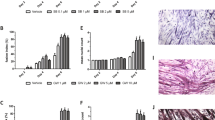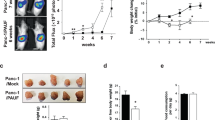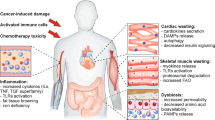Abstract
A proteolysis-inducing factor (PIF) isolated from a cachexia-inducing murine tumour (MAC16) produced a decrease in body weight (1.6 g, P < or = 0.01 compared with control subjects) within 24 h after i.v. administration to non-tumour-bearing mice. Weight loss was associated with significant decreases in the weight of the spleen and soleus and gastrocnemius muscles, with no effect on the weight of the heart or kidney and with an increase in weight of the liver. Protein degradation in isolated soleus muscle was significantly increased in mice bearing the MAC16 tumour. To define which proteolytic pathways contribute to this increase, soleus muscles from mice bearing the MAC16 tumour and non-tumour-bearing animals administered PIF were incubated under conditions that modify different proteolytic systems. In mice bearing the MAC16 tumour, there were increases in both cathepsin B and L, and the Ca2+-dependent lysosomal and ATP-dependent pathways were found to contribute to the increased proteolysis; whereas, in PIF-injected animals, there was activation only of the ATP-dependent pathway. Further studies in mice bearing the MAC16 tumour have provided evidence for increased levels of ubiquitin-conjugated proteins and increased mRNA levels for the 14 kDa ubiquitin carrier protein E2 and the C9 proteasome subunit in gastrocnemius muscle, suggesting activation of the ATP-ubiquitin-dependent proteolytic pathway. A monoclonal antibody to PIF attenuated the enhanced protein degradation in soleus muscle from mice bearing the MAC16 tumour, confirming that PIF is responsible for the loss of skeletal muscle in cachectic mice.
This is a preview of subscription content, access via your institution
Access options
Subscribe to this journal
Receive 24 print issues and online access
$259.00 per year
only $10.79 per issue
Buy this article
- Purchase on Springer Link
- Instant access to full article PDF
Prices may be subject to local taxes which are calculated during checkout
Similar content being viewed by others
Author information
Authors and Affiliations
Rights and permissions
About this article
Cite this article
Lorite, M., Thompson, M., Drake, J. et al. Mechanism of muscle protein degradation induced by a cancer cachectic factor. Br J Cancer 78, 850–856 (1998). https://doi.org/10.1038/bjc.1998.592
Issue Date:
DOI: https://doi.org/10.1038/bjc.1998.592
This article is cited by
-
Metformin treatment modulates the tumour-induced wasting effects in muscle protein metabolism minimising the cachexia in tumour-bearing rats
BMC Cancer (2016)
-
Leucine-rich diet supplementation modulates foetal muscle protein metabolism impaired by Walker-256 tumour
Reproductive Biology and Endocrinology (2014)
-
Molecular and cellular mechanisms of skeletal muscle atrophy: an update
Journal of Cachexia, Sarcopenia and Muscle (2012)
-
C/EBPβ mediates tumour-induced ubiquitin ligase atrogin1/MAFbx upregulation and muscle wasting
The EMBO Journal (2011)
-
Attenuation of muscle atrophy by an N-terminal peptide of the receptor for proteolysis-inducing factor (PIF)
British Journal of Cancer (2011)



